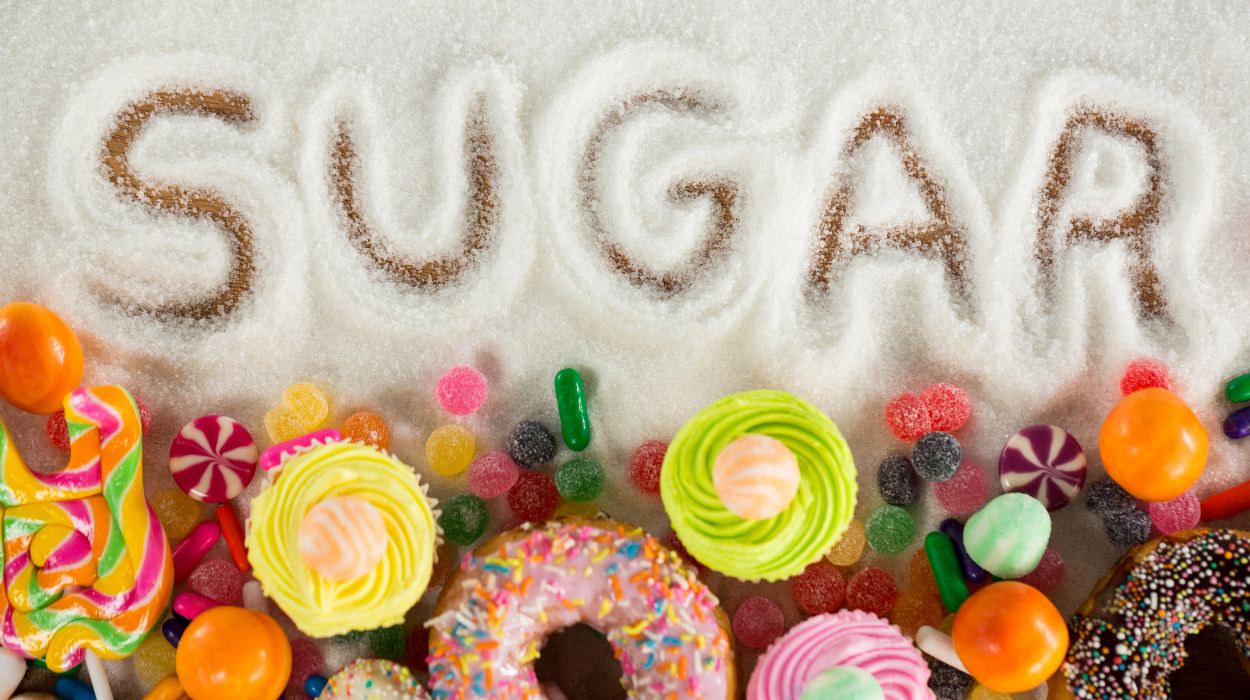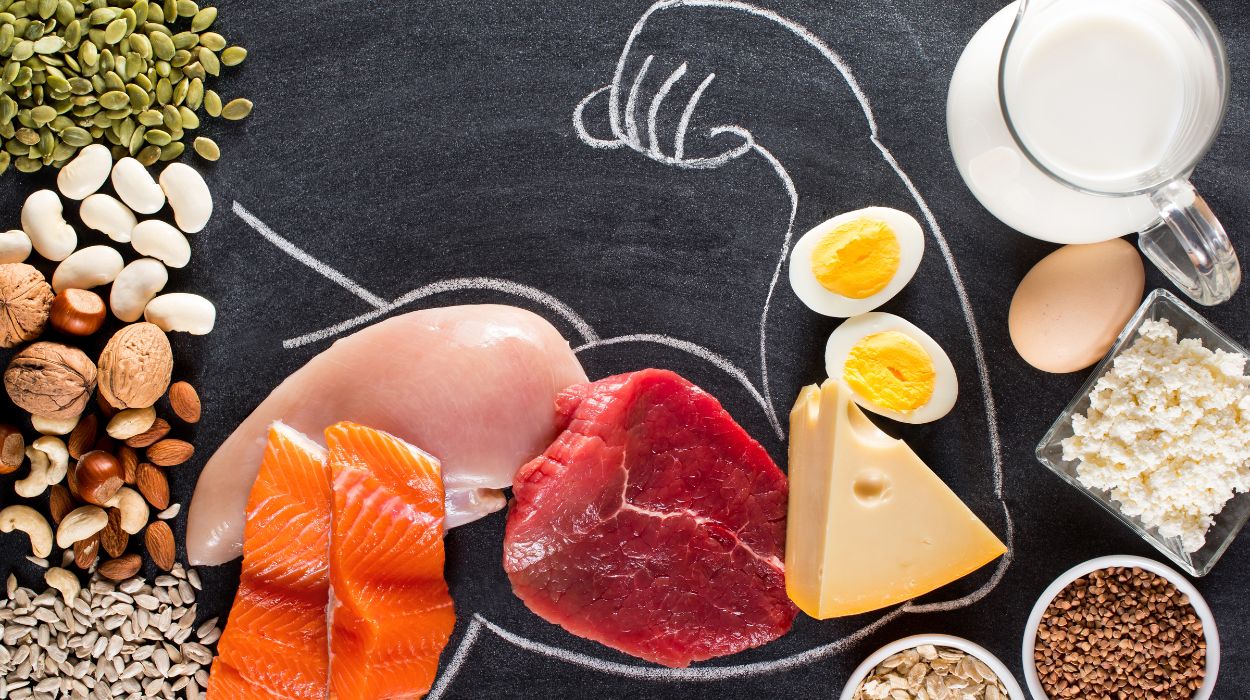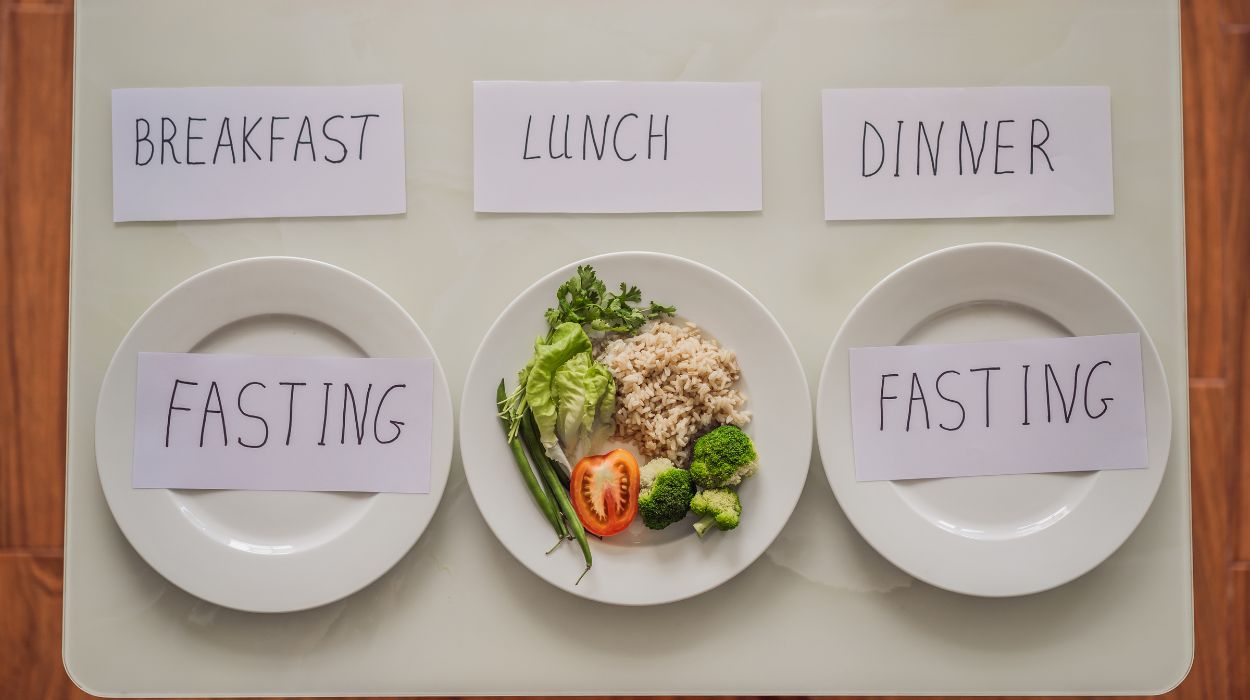How To Lose Weight Fast Without Exercise: Useful Tips To Know 2024

There are a plethora of ways to lose weight. And the rapidly growing weight loss industry doesn’t stop presenting us with new things now and then. But still many struggle with shedding those extra pounds. According to the Centers for Disease Control and Prevention[1] (2017- 2018), 42.5% of adults aged 20 and over are obese, whereas, 73.6% of them are both obese and overweight.
Many fad diets have come and gone. We are presented with fast foods as well as fast weight loss schemes. We live in a period where it’s hard to get away from processed foods, large portions, and stress.
However, if you experience a sudden change in your body weight, get your medical tests for thyroid, and PCOS to check for hormonal weight gain. Moreover, depression can also lead to weight gain. It’s a better choice to go with a doctor’s advice in these cases. Nevertheless, here are some tips that can be used by everyone.
Let me walk you through some scientifically proven and effective ways to lose weight without exercise.
Our 16 Best Ways To Lose Weight Without Exercise
- Drink water before a meal
- Chew your food slowly
- Cut on sugars and consume simple carbohydrates
- Eat small meals 6 times a day
- Move around more
- Go to bed early
- Viscous fiber-rich foods for a flat belly
- Thermogenic foods for fat loss
- Glucomannan natural supplements
- Add more protein to your diet
- Intermittent fasting
- Balance your gut bacteria
- Coconut oil for belly fat
- Practice mindful eating
- Being in a calorie deficit
- Stress can add weight
How To Lose Weight Without Going To The Gym?
Losing weight is a tedious job. It takes determination, planning, and a lot of willpower to lose those extra pounds. Going to the gym and working out is a straightforward solution. However, not everyone can do that for various reasons. But, don’t worry! There are several ways you could lose weight, even without going to the gym and lifting those weights. Here are some of the best ways to help you in your weight loss journey:
Drink Water Before A Meal

Hydration is the key to weight loss[2]. By drinking more water you tend to lose weight through two scientifically proven mechanisms. Firstly, it decreases feeding, and secondly increases lipolysis. Lipolysis is nothing but breaking down fats and lipids with the help of water into fatty acids. Both in turn increase metabolism aiding in weight loss. And if consumed before a meal, you might reduce your food intake as well.
Chew Your Food Slowly
By eating slowly, you tend to reduce your food intake. Whereas, eating quickly is linked to overeating. Studies also show that eating slowly can increase the fullness of hormones[3]. These gut hormones not only reduce calorie intake but also reduce your appetite. Quick eaters tend to gain more weight and have a higher body mass index[4].
Cut On Sugars And Consume Simple Carbohydrates

Avoiding sugar is an easy way to consume fewer calories. So swap those flavored coffees with black coffee. By adding sugar, the calories skyrocket which would otherwise be zero to five-calorie drinks.
Consume complex carbohydrates[5] instead of simple ones. Some good sources of complex carbohydrates to lose weight are whole grains like quinoa and barley. Fruits like apples, berries, and vegetables like carrots, leafy greens, and broccoli are good choices. Lastly, healthy foods like legumes and beans are rich in minerals, fiber, and vitamins.
Eat Small Meals 6 Times A Day
Mini meals can help to satisfy the appetite, boost metabolism, stabilize blood sugar levels along providing nutrients throughout the day. Studies prove that eating more than six meals a day[6] can reduce the risk of obesity. You can support weight loss by having eggs, wholegrain cereals, low-fat milk, Greek yogurt, apples, berries, avocado and peaches, green salads, legumes, peas, chicken breast, and salmon.
Viscous Fiber-rich Foods For A Flat Belly
Fibers are a form of carbohydrates that cannot be digested by our bodies. Fibers that are highly viscous increase fullness and reduce appetite in turn promoting weight loss. Viscous fiber is found in healthy foods such as legumes, oats, brussels sprouts, beans, asparagus, and flax seeds. There is evidence that the weight loss effects of fiber, particularly target belly fat.[7]
Thermogenic Foods For Fat Loss
Foods that are thermogenic boost metabolism and burn calories through the process of thermogenesis. In this process, the body burns calories into heat from the food that you just consumed. thermogenic foods increase the expenditure of energy by 4-5% and fat oxidation by 10-16 %[8]. Consuming caffeine, capsaicin, green tea, and oolong tea is known to be thermogenic. An increase in thermogenesis of 300- 400 KJ daily can eventually lead to significant weight loss.
Glucomannan Natural Supplements
Glucomannan is a plant-based dietary fiber from the roots of the konjac plant also known as elephant yam. This fiber has low calories and occupies space in our stomachs. Glucomannan[9] is one of the best high-viscous dietary fibers that’s proven to help lose weight. And has a remarkable ability to absorb water is thought to make it an effective remedy for weight loss. One capsule of this dietary fiber can turn one entire glass of water into gel.
Add More Protein To Your Diet

Every cell in our body contains proteins. They are building blocks of our bodies. Our body tends to burn more calories while digesting and metabolizing the protein. So, diets that are rich in protein can increase metabolism[10] and aid in weight loss.
Protein-rich foods such as eggs, salmon, tuna, lean beef, chicken breast, black beans, lima beans, boiled potatoes, cruciferous veggies, and legumes are excellent choices to help you lose weight.
Intermittent Fasting

It is a cycle of eating and fasting. There are many types of intermittent fasting. The 16/8 method implies 16 hours of fasting and 8 hours of eating period. Whereas, 5: 2 diet involves eating 500 -600 calories two days a week. Eat stop Eat involves fasting one or two times for 24 hours per week. Alternate day fasting is fasting every alternate day.
Overall, with all these methods you tend to eat fewer calories in turn leading to weight loss.[11]
Balance Your Gut Bacteria
Studies have shown that lower gut bacterial diversity was associated with obesity. Our gut bacteria digest antioxidants called flavonoids. This way, weight gain is prevented. Moreover, gut bacteria control the dietary fats absorption in our intestines and fat storage in the body.
Numerous studies have shown that consumption of high fiber intake was associated with lower weight[12], this is due to digestion of dietary fiber by gut bacteria. So consume prebiotic foods, plant-based foods, and fermented foods.
Coconut Oil For Belly Fat
Coconut oil is a rich source of medium-chain triglycerides and is a healthy fat. Coconut oil promotes fullness and decreases appetite. Additionally, MCTs are metabolized differently compared to other fats. They are known to boost metabolism. It’s particularly beneficial in lowering harmful belly fat and obesity[13]. The best way to use it is by replacing unhealthy fats with coconut oil.
Mindful Eating
Mindful eating is often overlooked. A practice of focusing on how, where and what you eat. It will make food enjoyable and help you lose weight. Eating by sitting in one place completely devoid of any distractions. Choosing nourishing foods. And chewing slowly and savoring the food. By doing so, your brain has adequate time to perceive signals when you are full. This way overeating and cravings are prevented[14].
Being In A Calorie Deficit
When you burn more calories than you eat, then you will achieve a calorie deficit. As per the U.S. Dietary guidelines[15] for 2015 – 2020 the adult man needs between 2000-3000 calories, whereas, women need about 1600-2,400 calories a day. To be calorie deficient and lose weight, you need to cut sugars, saturated fats, and limit sodium intake. Eat whole foods, veggies, and fruits that are low in calories.
Lifestyle Changes That Will Help You Lose Weight
Your lifestyle has a great impact on your body. Without a disciplined lifestyle, you will most probably continue to put on weight. By making simple yet important changes to your day-to-day activities, you could achieve healthy weight loss. Here are a few tips that will help you in your weight loss journey and be in a healthy state:
Move Around More
If you are someone, who works behind a desk. You probably won’t move around a lot. But here is what you can do. Drink more water. More water means more pee breaks. Walk and talk on the phone. Take stairs more often. Stand during your commute. Park your car far away from the destination. Physical activity such as walking not only aids in weight loss but also improves overall health.
Go To Bed Early
Many studies have reported that sleeping less than 5-6 hours[16] per night is linked with obesity. Poor sleep slows down the metabolism. Moreover, the amount of sleep also regulates the hunger hormones leptin and ghrelin. Besides, it increases the stress hormone- cortisol and makes your body hold on to fat. Adults need 7 to 8 hours of sleep.
Stress Can Add Weight
Stress can increase the stress hormone[17] – cortisol levels. Cortisol is known to slow metabolism and is also a potent appetite stimulant. Many people tend to respond to this by eating comfort food. Increased cortisol leads to high insulin levels which cause blood sugar to drop. Also cravings for sugar and fat kick in. Gradually, developing a habit of overeating. To combat stress-related weight gain, it’s always better to visit a doctor.
Final Words
People are eating more calories than they did before. The obesity epidemic is rapidly growing as well. You don’t have to hate your body. Accept your body and see what works best for you. Although, body positivity is a great movement. Let’s not lose sight of the bigger picture. Health is wealth. Small changes in your lifestyle can go a long way. But consistency is what makes all the difference.
+ 17 sources
Health Canal avoids using tertiary references. We have strict sourcing guidelines and rely on peer-reviewed studies, academic researches from medical associations and institutions. To ensure the accuracy of articles in Health Canal, you can read more about the editorial process here
- Anon, (2021). FastStats – Overweight Prevalence. [online] Available at: https://www.cdc.gov/nchs/fastats/obesity-overweight.htm
- Thornton, S.N. (2016). Increased Hydration Can Be Associated with Weight Loss. Frontiers in Nutrition, [online] 3. Available at: https://www.ncbi.nlm.nih.gov/pmc/articles/PMC4901052/
- Kokkinos, A., le Roux, C.W., Alexiadou, K., Tentolouris, N., Vincent, R.P., Kyriaki, D., Perrea, D., Ghatei, M.A., Bloom, S.R. & Katsilambros, N. (2010). Eating Slowly Increases the Postprandial Response of the Anorexigenic Gut Hormones, Peptide YY and Glucagon-Like Peptide-1. The Journal of Clinical Endocrinology & Metabolism, [online] 95(1), pp.333–337. Available at: https://pubmed.ncbi.nlm.nih.gov/19875483/
- Leong, S.L., Madden, C., Gray, A., Waters, D. & Horwath, C. (2011). Faster Self-Reported Speed of Eating Is Related to Higher Body Mass Index in a Nationwide Survey of Middle-Aged Women. Journal of the American Dietetic Association, [online] 111(8), pp.1192–1197. Available at: https://pubmed.ncbi.nlm.nih.gov/21802566/
- Ma, Y. (2005). Association between Dietary Carbohydrates and Body Weight. American Journal of Epidemiology, [online] 161(4), pp.359–367. Available at: https://www.ncbi.nlm.nih.gov/pmc/articles/PMC1199523/
- Paoli, A., Tinsley, G., Bianco, A. & Moro, T. (2019). The Influence of Meal Frequency and Timing on Health in Humans: The Role of Fasting. Nutrients, [online] 11(4), p.719. Available at: https://www.ncbi.nlm.nih.gov/pmc/articles/PMC6520689/
- Hairston, K.G., Vitolins, M.Z., Norris, J.M., Anderson, A.M., Hanley, A.J. & Wagenknecht, L.E. (2012). Lifestyle Factors and 5-Year Abdominal Fat Accumulation in a Minority Cohort: The IRAS Family Study. Obesity, [online] 20(2), pp.421–427. Available at: https://www.ncbi.nlm.nih.gov/pmc/articles/PMC3856431/
- Hursel, R. & Westerterp-Plantenga, M.S. (2010). Thermogenic ingredients and body weight regulation. International Journal of Obesity, [online] 34(4), pp.659–669. Available at: https://pubmed.ncbi.nlm.nih.gov/20142827/
- Devaraj, R.D., Reddy, C.K. & Xu, B. (2019). Health-promoting effects of konjac glucomannan and its practical applications: A critical review. International Journal of Biological Macromolecules, [online] 126, pp.273–281. Available at: https://pubmed.ncbi.nlm.nih.gov/30586587/
- Pesta, D.H. & Samuel, V.T. (2014). A high-protein diet for reducing body fat: mechanisms and possible caveats. Nutrition & Metabolism, [online] 11(1), p.53. Available at: https://www.ncbi.nlm.nih.gov/pmc/articles/PMC4258944/
- Johnstone, A. (2014). Fasting for weight loss: an effective strategy or latest dieting trend? International Journal of Obesity, [online] 39(5), pp.727–733. Available at: https://pubmed.ncbi.nlm.nih.gov/25540982/
- Menni, C., Jackson, M.A., Pallister, T., Steves, C.J., Spector, T.D. & Valdes, A.M. (2017). Gut microbiome diversity and high-fibre intake are related to lower long-term weight gain. International Journal of Obesity, [online] 41(7), pp.1099–1105. Available at: https://www.ncbi.nlm.nih.gov/pmc/articles/PMC5500185/
- Vogel, C.É., Crovesy, L., Rosado, E.L. & Soares-Mota, M. (2020). Effect of coconut oil on weight loss and metabolic parameters in men with obesity: a randomized controlled clinical trial. Food & Function, [online] 11(7), pp.6588–6594. Available at: https://pubmed.ncbi.nlm.nih.gov/32648861/
- Mason, A.E., Saslow, L., Moran, P.J., Kim, S., Abousleiman, H., Hartman, A., Richler, R., Schleicher, S., Hartogensis, W., Epel, E.S. & Hecht, F. (2019). Examining the Effects of Mindful Eating Training on Adherence to a Carbohydrate-Restricted Diet in Patients With Type 2 Diabetes (the DELISH Study): Protocol for a Randomized Controlled Trial. JMIR Research Protocols, [online] 8(2), p.e11002. Available at: https://www.ncbi.nlm.nih.gov/pmc/articles/PMC6401674/
- health.gov. (2015). Dietary Guidelines For Americans 2015-2020 8th Edition. Available at: https://health.gov/sites/default/files/2019-09/2015-2020_Dietary_Guidelines.pdf
- Xiao, Q., Arem, H., Moore, S.C., Hollenbeck, A.R. & Matthews, C.E. (2013). A Large Prospective Investigation of Sleep Duration, Weight Change, and Obesity in the NIH-AARP Diet and Health Study Cohort. American Journal of Epidemiology, [online] 178(11), pp.1600–1610. Available at: https://www.ncbi.nlm.nih.gov/pmc/articles/PMC3842900/
- Scott, K.A., Melhorn, S.J. & Sakai, R.R. (2012). Effects of Chronic Social Stress on Obesity. Current Obesity Reports, [online] 1(1), pp.16–25. Available at: https://www.ncbi.nlm.nih.gov/pmc/articles/PMC3428710/



